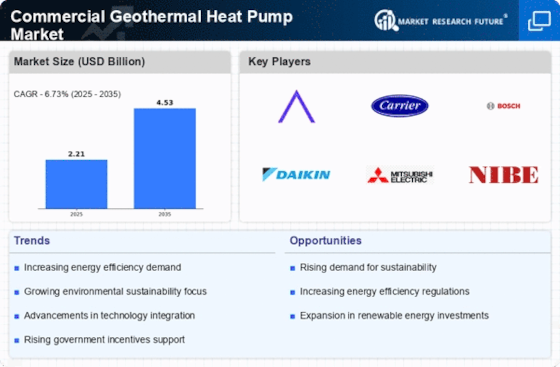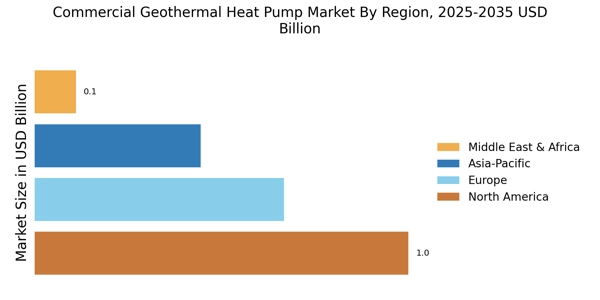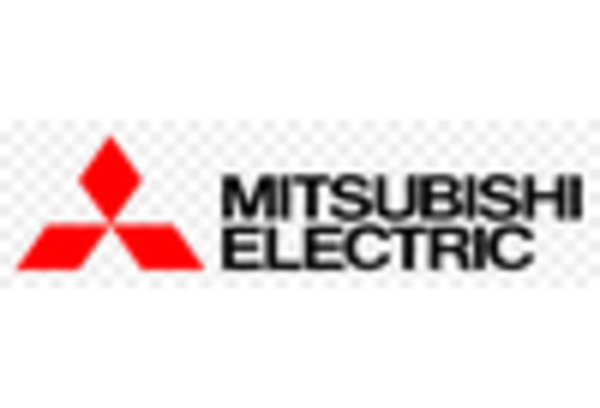Rising Energy Costs
The increasing cost of energy is a pivotal driver for the Commercial Geothermal Heat Pump Market. As traditional energy sources become more expensive, businesses are seeking alternative solutions to mitigate operational costs. Geothermal heat pumps offer a sustainable and cost-effective heating and cooling solution, which can significantly reduce energy bills. According to recent data, commercial buildings utilizing geothermal systems can achieve energy savings of up to 70% compared to conventional systems. This financial incentive is compelling for businesses aiming to enhance their bottom line while also addressing energy efficiency mandates. The trend towards energy conservation is likely to propel the adoption of geothermal technology in commercial settings, thereby expanding the market.
Technological Innovations
Technological innovations are significantly influencing the Commercial Geothermal Heat Pump Market. Advances in geothermal technology, such as improved heat exchange systems and enhanced drilling techniques, are making geothermal heat pumps more efficient and cost-effective. These innovations are enabling the development of systems that can be installed in a wider range of commercial applications, including retrofitting existing buildings. Furthermore, the integration of smart technology into geothermal systems allows for better energy management and optimization, which can lead to increased energy savings. As technology continues to evolve, it is expected that the market will see a rise in the adoption of geothermal heat pumps, driven by their enhanced performance and reliability.
Government Incentives and Rebates
Government incentives and rebates play a crucial role in promoting the Commercial Geothermal Heat Pump Market. Various governments are implementing financial incentives to encourage the adoption of renewable energy technologies, including geothermal systems. These incentives can take the form of tax credits, grants, or low-interest loans, making the initial investment in geothermal technology more accessible for businesses. For instance, certain regions have reported a surge in geothermal installations due to favorable government policies that support renewable energy initiatives. This financial backing not only reduces the upfront costs but also enhances the return on investment for commercial entities. As such, the presence of supportive government policies is likely to stimulate market growth.
Growing Demand for Energy Efficiency
The increasing demand for energy efficiency is a significant driver for the Commercial Geothermal Heat Pump Market. Businesses are under pressure to reduce energy consumption and improve operational efficiency, which has led to a surge in interest in energy-efficient technologies. Geothermal heat pumps are recognized for their ability to provide substantial energy savings while maintaining comfort levels in commercial spaces. Reports indicate that the market for energy-efficient heating and cooling solutions is expanding, with geothermal systems being a preferred choice due to their long-term cost benefits. As energy efficiency becomes a priority for businesses, the adoption of geothermal heat pumps is likely to accelerate, further propelling market growth.
Increased Awareness of Environmental Impact
There is a growing awareness among businesses regarding their environmental footprint, which serves as a strong driver for the Commercial Geothermal Heat Pump Market. Companies are increasingly prioritizing sustainability in their operations, recognizing that eco-friendly practices can enhance their brand image and attract environmentally conscious consumers. Geothermal heat pumps, which utilize the earth's natural heat, are seen as a viable solution to reduce greenhouse gas emissions. The market is witnessing a shift as organizations aim to comply with stringent environmental regulations and corporate social responsibility initiatives. This heightened focus on sustainability is expected to drive the demand for geothermal systems, as businesses seek to align their operations with global sustainability goals.

















